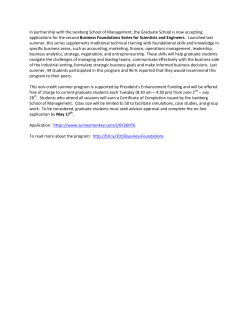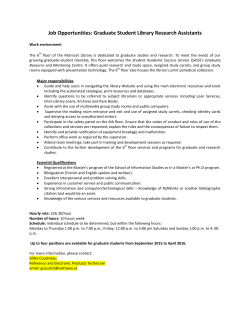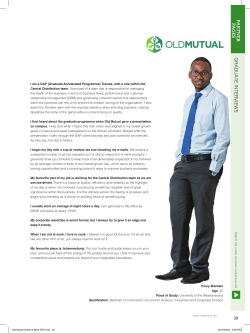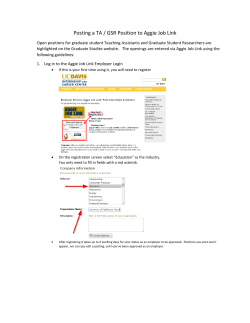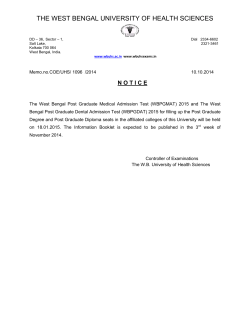
ICLON, Leiden University Graduate School of Teaching
Issues in the design of Massive Open Online Course Wilfried Admiraal ICLON, Leiden University Graduate School of Teaching Structure • • • • • Taxonomy of MOOCs Definition of MOOCs as open online learning Research on MOOCs Rethinking educational variables Research agenda ICLON, Leiden University Graduate School of Teaching Some Leiden University MOOCs ICLON, Leiden University Graduate School of Teaching MOOC platforms • • • • • Coursera (www.coursera.org) EdX (www.edx.org) Udacity (www.udacity.org) OpenupEd (www.opened.ed) Other national platforms in Europe, Asia and Australia (Futurelearn, iversity, ALISON, Open2Study, XuetangX.com) • Local university platforms ICLON, Leiden University Graduate School of Teaching Typical (?) MOOC • • • • • • • • • Course 4-12 weeks Video lectures Online materials Discussion platform Quizzes, essay assignments & final MC-exam Thousands of registrants Only a few hundred obtain certificate Learner commitment wanes Learners: 2-6 hrs per week ICLON, Leiden University Graduate School of Teaching Taxonomy of MOOCs (1) cMOOC xMOOC Socio-constructivist view Behaviorist-cognitive view Participant driven Subject driven Student-student, student-teacher, student-environment interaction Student-environment interaction Teacher is facilitator/collaborator Teacher is expert/authority Social media, student-created materials Assessment for learning Lecture videos, text-based readings, assignments MC-tests, quizzes, peer review ICLON, Leiden University Graduate School of Teaching Taxonomy of MOOCs (2) • • • • • • • • • DOCC (Distributed Open Collaborative Course) POOC (Participatory Open Online Course) SPOC (Small Private Online Course) BOOC (Big Open Online Course) HOOC (Hybrid Open Online Course) gMOOC (game MOOC) SMOC (synchronous Massive Online Course miniMOOC (short version of a MOOC) tMOOC (task-based MOOC) ICLON, Leiden University Graduate School of Teaching Massiveness and Openness Open and flexible Less More Smaller SPOC miniMOOC cMOOC DOCC POOC gMOOC Larger BOOC HOOC SMOC xMOOC tMOOC Massiveness 8 ICLON, Leiden University Graduate School of Teaching Diversity • Openness: • • • • • Flexibility in time, Blended or not with campus education, Adaptivity in pace and tracks, Accessibility Free or little costs • Massiveness • Focus ICLON, Leiden University Graduate School of Teaching Simple definition of MOOC “MOOCs are online environments that feature courselike experiences – for example lectures, labs, discussions, and assessments- for little to no cost” (p. 74 DeBoer et al., 2014) ICLON, Leiden University Graduate School of Teaching Review MOOC research • Thoughts about design (Creelman et al., 2014; Statey, 2014;Walker & Loch, 2014) • Course evaluations (students and teachers) (Hew & Cheung, 2014; Walker & Loch, 2014) • Descriptive research on student profiles (Hew & Cheung, 2014) • Descriptive research on implementation (DeBoer et al., 2014; Toven-Lindsay et al., 2015) • Taxonomies of pedagogies (Conole, 2014; Margaryan et al., 2015; Swan et al., 2015) • No controlled experiments or A/B testing ICLON, Leiden University Graduate School of Teaching Instruction, interaction & assessment (Toven-Lindsey et al., 2015); 24 MOOCs Modes of Instruction Interaction Assessment More Less Text, video-taped instructor Recorded lectures, animation/avatars Student-student: Discussion board (Q&A, dialogue) Student-teacher: static posts Open ended Student-student: Chat, discussion prompts Student-teacher: Teacher active, live event MC, activity, discussion board posts, external resources ICLON, Leiden University Graduate School of Teaching Instructional quality (Margaryan et al., 2015); 76 MOOCs Problem centred Real-world, ill-structured problems Activation Activate prior knowledge & experiences Demonstration Good & poor examples Application Apply particular knowledge in context Integration Integrate knowlede in everyday work Collective Reciprocal interdepence students Collaboration Peer interaction Differentiation Learning options Authentic resources Real-world materials Feedback Expert feedback ICLON, Leiden University Graduate School of Teaching MOOC pedagogy: theory & practice Organisation Learning materials Differentiation Peer interaction Assignments Assessment Guidance Instruction ICLON, Leiden University Graduate School of Teaching MOOC data: differences with campus education • Magnitude of data gathered (numbers of students, observation per student and types of information) • Diversity in student population (reasons for registration and background) • Non-linear learning paths ICLON, Leiden University Graduate School of Teaching Rethink educational variables (DeBoer et al. , 2014) • Enrollment: • dynamic starts, diversity reasons to register, diversity educational level (and unknown) • Participation: • Huge variety in what learners do (watching video, reading, assignments, quizzes, forums) • Curriculum and teacher: • Non-linear and large variety in learning routes • Achievement and assessment: • Final exam/grades for a small minority ICLON, Leiden University Graduate School of Teaching Research agenda • Controlled experiments or A/B testing • With in mind: • Theories of (online) learning • Reconceptualizing educational variables • Pragmatics of teaching MOOCs 1. 2. 3. 4. Peer interaction Assignments Guidance Assessment ICLON, Leiden University Graduate School of Teaching Research agenda: 1. Peer interaction • • • • • Peer feedback / peer assistance Reciprocal interdependence Discussion groups (focus, moderation, composition) Social media outside course Live events with peers ICLON, Leiden University Graduate School of Teaching Research agenda: 2. Assignments • • • • • Assignment to create/produce Ill-structured probems Learner regulation / autonomy Multiple perspectives (background student) Follow-up events ICLON, Leiden University Graduate School of Teaching Research agenda: 3. Guidance • • • • • Differentiation in learning paths / tracks Adaptive instruction (fading scaffolding) Simulations and games Formal and informal learners (blend with campus) More experts than one expert teacher ICLON, Leiden University Graduate School of Teaching Research agenda: 4. Assessment • Self, peer en co-assessment • Quality of automated assessments • Assessment of what (activities, participation and knowledge)? ICLON, Leiden University Graduate School of Teaching Research agenda: Make use of student data for • • • • Peer interaction Assignments Guidance Assessment ICLON, Leiden University Graduate School of Teaching I would like to thank my colleagues Olga Pilli and Bart Huisman for their contribution More information: w.f.admiraal@iclon.leidenuniv.nl 23 ICLON, Leiden University Graduate School of Teaching Suggested readings Conole, G. (2014). A new classification schema for MOOCs. International Journal for Innovation and Quality in Learning, 2(3), 65-77. Creelman, A., Ehlers, U-D., & Ossiannilsson, E. (2014). Perpsectives on MOOC quality. International Journal for Innovation and Quality in Learning, 78-87. DeBoer, J., Ho, A. D., Stump, G. S., & Breslow, L. (2014). Changing "Course": Reconceptualizing Educational Variables for Massive Open Online Courses. Educational Researcher, 43(2), 74-84. Hew, K. F., & Cheung, W. S. (2014). Students' and instructors' use of massive open online courses (MOOCs): Motivations and challenges. Educational Research Review, 12, 45-58. Margaryan, A., Bianco, M., & Littlejohn, A. (2015). Instructional quality of Massive Open Online Courses (MOOVs). Computers & Education, 80, 77-83. Stacey, P. (2014). Pedagogy of MOOCs. International Journal for Innovation and Quality in Learning, 111-115. Swan, K., Bogle, L., Day, S., Matthews, D. (2014, April). The Assessing MOOC Pedagogies (AMP) project. Paper presented at the annual conference of the AERA, Philadelphia, USA. Toven-Lindsey, B., Rhoads, R. A., & Lozano, J. B. (2015). Virtually unlimited classrooms: Pedagogical practices in massive open online courses. The Internet and Higher Education, 24, 1-12. Walker, L., & Loch, B. (2014). Academics’ perception on the quality of MOOCs: An empirical study. International Journal for Innovation and Quality in Learning, 53-63. ICLON, Leiden University Graduate School of Teaching
© Copyright 2025
